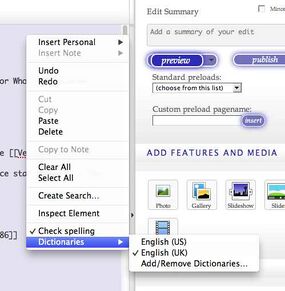Tardis:Spell checking with Opera
Spell checking using the Opera browser is easy to set up, but you will have to instal an extension. Also, the British English dictionary that performs the spell check in Opera is a generic, open-source dictionary, and seems to have a few problems with some relatively obscure British spellings. Nevertheless, the Opera dictionary seems far better than the truly abysmal Firefox dictionary.
Why do we care so much about british spell checking here? Because it's just the way we roll on this site. British spellings are required here.
Setup
Opera — at least insofar as versions 11 and 12 are concerned — spell checks in American English by default. To add British spell checking, you must follow a few steps. The following instructions seem to apply to both Windows and Mac installations:
- Navigate to a page on this wiki that you can edit
- Edit the page
- Right click on the editing pane. Pull down to Dictionaries. If you've already installed the British dictionary, you'll see it there. If not, you'll have to choose to add it.
- Once you've installed the UK dictionary, select it, as is indicated in the picture at right.
- You're done!
Mac users: Safari versus Opera
Safari for Mac offers the best British spelling environment, as of 2012. That's why we generally recommend that Mac users edit with Safari only. Why? Opera doesn't auto-correct or auto-suggest like Safari does. So although it flags misspellings, you'll still make fewer British spelling errors with Safari than Chrome.
The other, more worrying issue is that of accuracy. The open source dictionary that Opera uses is okay — certainly better than the one Firefox uses — but it's not nearly as good as the one that Safari employs. You'll simply have greater spelling accuracy if you entrust your spell checking to Safari.

